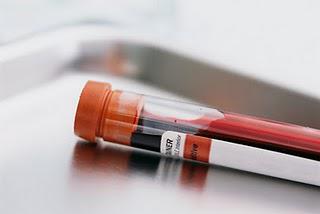
In my July column at EnduranceCorner, I wrote an article entitled, "What is Your Blood Telling You?" I get many questions from athletes asking how to interpret the various common blood tests and I offered this article to lay out some useful information about these tests.
My Recommendations
In that article, I also offered a recommendation about which tests might be useful, on a regular basis, for endurance athletes who might be readers. I suggested an annual physical examination (with particular attention to the cardiovascular system), an annual complete blood count (CBC) and basic metabolic profile (BMP). I also suggested that a lipid profile (total cholesterol, low density lipoprotein [LDL], high density lipoprotein [HDL], and serum triglycerides) be checked every 5 years in accordance with recommendations from the American Heart Association (AHA). Finally, I recommended an EKG and echocardiogram, once, at some point early in an athlete's career to rule out most of the hereditary conditions that predispose athletes to sudden death.
I've received a variety of comments about that article, not only here at the blog but also by email, phone, etc. There were those who felt that my recommendations went too far....and there were those who felt that my recommendations didn't go far enough! Given the balance of replies, I'm probably in the right spot on the issue. Importantly, I still believe that my recommendations are prudent for most endurance athletes and I would urge you to adopt these simple recommendations.
A Noteworthy Study
In fairness to those who wrote to let me know of the futility of routine screening blood tests, particularly in athletes, I thought I would share with you the findings of a recent study on this topic. The report comes from a K. E. Fallon, the Head of Sports Medicine at the Australian Institute of Sport and is entitled, "The clinical utility of screening of biochemical parameters in elite athletes: analysis of 100 cases."
Fallon notes that there are several reasons that have motivated routine blood tests in athletes, including:
1. the goal of establishing a "normal" range for athletes;
2. the goal of establishing, for an individual athlete, a baseline set of values that could be useful should medical problems develop; and
3. the goal of being able to diagnose (or better yet, predict) a state of overtraining.
Although each of these goals may be important, it is important to remember that routine laboratory screening is costly--and in most cases, that cost is not covered by medical plans in the United States.
The study included 100 elite athletes (56 men, 44 women) from 11 different sports (rowing, football, basketball, netball, boxing, athletics, swimming, volleyball, athletics for AWD, archery, canoeing). The list of screening blood tests included: serum iron, ferritin, transferin, percent transferrin saturation, sodium, potassium, chloride, calcium, magnesium, phosphate, urate, urea and creatinine, total protein, albumin, creatine kinase (CK), lactate dehydrogenase (LDH), aspartate aminotransaminase (AST), alanine aminotransferase (ALT), alkaline phosphatase (AP), gamma-glutamyl transpeptidase (GGT), total bilirubin, cholesterol and triglycerides (non-fasting), and random glucose.
If abnormal results were obtained once, the athlete was interviewed for clinical symptoms, and repeat blood testing was performed.
It turns out that 18 athletes had no abnormalities on the screening tests. A total of 194 abnormal results were identified in the remaining 82 athletes. Of those, 43 tests did not return to normal on the repeat test. The most common abnormalities were increases in AST (27%), phosphate (13%), CK (13%), urea (12%), and bilirubin (12%). Three cases of lipid disorders and 1 case of hemochromatosis were identified. An additional athlete eventually received the diagnosis of Epstein-Barr virus infection, suspected because of an abnormal liver function test.
Fallon concluded that most abnormal blood test results from routine screening had no clinical significance and that routine screening should be abandoned.
Final Thoughts
Like I said above, I still like my recommendations of a yearly physical examination, CBC, and BMP along with a lipid profile check every 5 years. Beyond that, I suggest that you work with your physician to determine which, if any, additional screening tests may be useful for your particular situation. And I think we can all agree that targeted laboratory tests that are selected to confirm or exclude diagnoses that are suspected clinically, are still useful.
